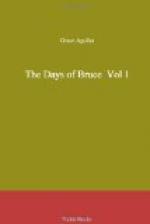“In the reign of Malcolm the Second, the districts now called Aberdeen and Forfar were possessed, and had been so, so tradition saith, since Kenneth MacAlpine, by the Lords of Brus or Bris, a family originally from the North. They were largely and nobly connected, particularly with Norway and Gaul. It is generally supposed the first possessions in Scotland held in fief by the line of Bruce can be traced back only to the time of David I., in the person of Robert de Bruce, an Anglo-Norman baron, whose father came over to England with the Conqueror. The cause of this supposition my tale will presently explain.
“Haco Brus or Bris was the Lord of Aberdeen in the reign of Malcolm the Second. He spent many years abroad; indeed, was supposed to have married and settled there, when, to the surprise of his vassals, he suddenly returned unmarried, and soon after uniting himself with a beautiful and accomplished girl, nearly related to the blood-royal of Scotland, settled quietly in this tower, which was the stronghold of his possessions. Years passed; the only child of the baron, a son, born in the first year of his marriage, grew up in strength and beauty, the idol not only of his mother, but of his father, a man stern and cold in seeming, even morose, but with passions fearful alike in their influence and extent. Your eye glances to that pictured face, he was not the baron’s son of whom I speak. The affections, nay, the very passions of the baron were centered in this boy. It is supposed pride and ambition were their origin, for he looked, through his near connection with the sovereign, for further aggrandizement for himself. There were some who declared ambition was not the master-passion, that a deeper, sterner, fiercer emotion dwelt within. Whether they spoke thus from the sequel, I know not, but that sequel proved their truth.
“There was a gathering of all the knightly and noble in King Malcolm’s court, not perchance for trials at arms resembling the tournays of the present day, but very similar in their motive and bearing, though ruder and more dangerous. Tho wreath of glory and victory was ever given by the gentle hand of beauty. Bright eyes and lovely forms presided at the sports even as now, and the king and his highest nobles joined in the revels.
“The wife of the Baron of Brus and his son, now a fine boy of thirteen, were of course amongst the royal guests. Though matron grace and dignified demeanor had taken the place of the blushing charms of early girlhood, the Lady Helen Brus was still very beautiful, and as the niece of the king and wife of such a distinguished baron, commanded and received universal homage. Among the combatants was a youthful knight, of an exterior and bearing so much more polished and graceful than the sons of the soil or their more northern visitors, that he was instantly recognized as coming from Gaul, then as now the most polished kingdom of the south. Delighted with his bravery,




